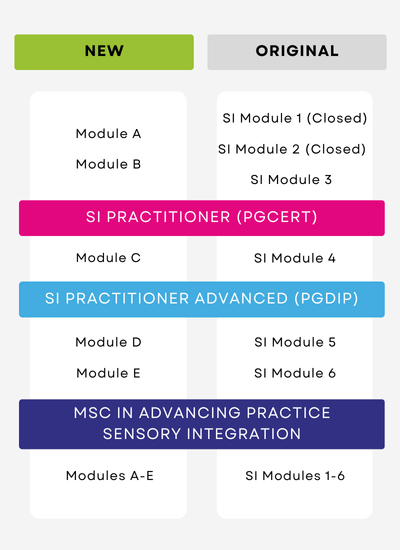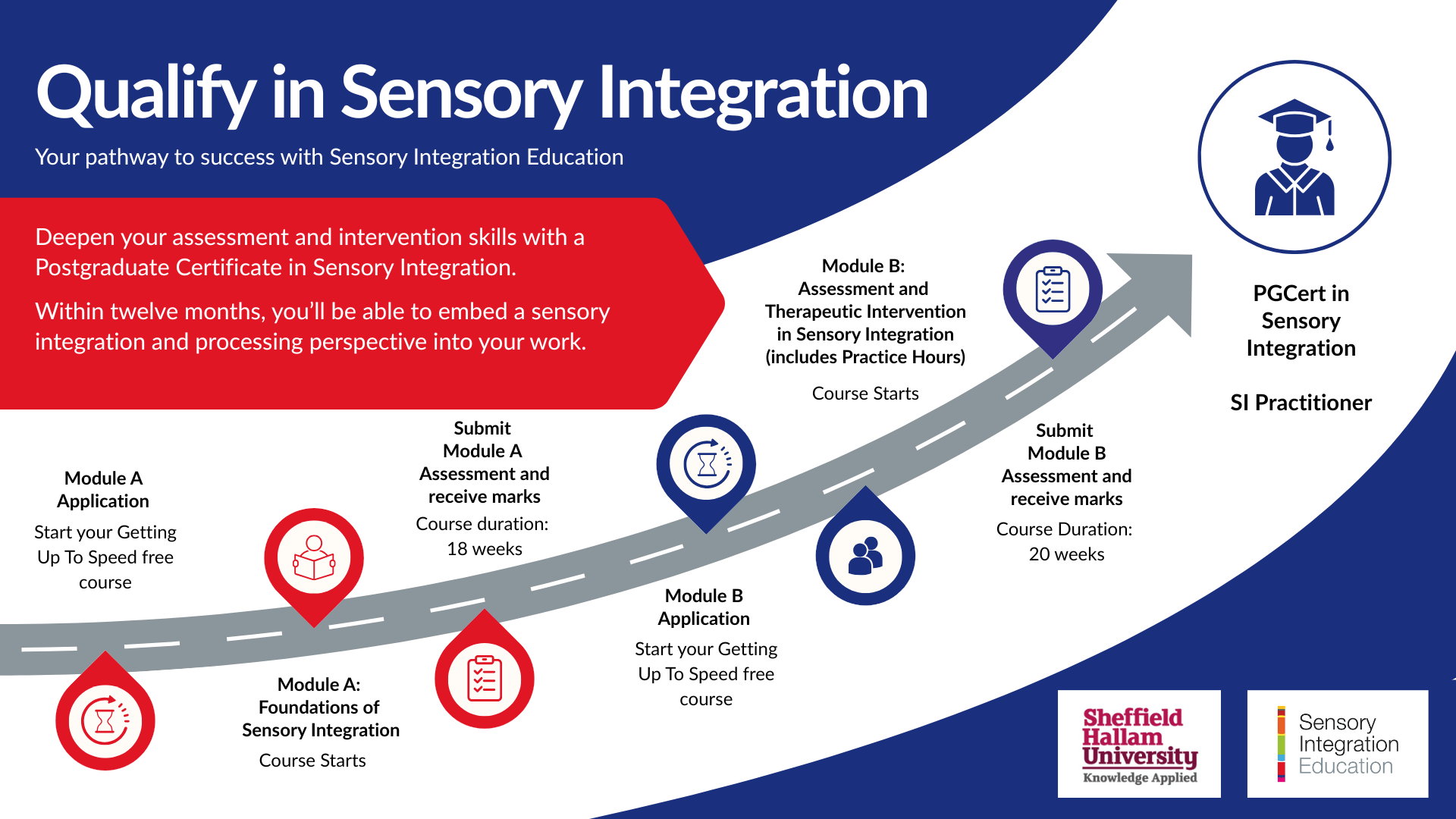Postgraduate Qualifications in Sensory Integration
University-Accredited Postgraduate Training in Ayres Sensory Integration®
30+ years • 100,000+ learners • 5-star Trustpilot • 1,700+ reviews
Pick the route that matches your goals. You can study one module at a time - and progress as far as you wish.
SI Practitioner
Complete within 12 months
SI Practitioner (Advanced)
Complete within 19 months
SI Practitioner (Advanced)
Complete within 36 months
Clinical Mentoring: included if you have a workplace mentor.
If you choose an external mentor, budget approx. £50/hr (2 hrs in Module B, 3 hrs in Module C).
Interest-free payment plans available. No VAT to pay (SIE is not VAT registered).
This postgraduate pathway is for qualified health and care professionals who want to train in sensory integration.
You’ll need:
The right professional qualification and/or registration (depending on the route)
Access to relevant clients in your clinical work
Time and commitment to practise, reflect, and build your skills
Why OTs train in sensory integration
Sensory processing differences can block everyday activities like dressing, eating, attention, and participation. SI training helps you identify what’s driving the difficulty and plan support that fits the person and the setting.
You’ll be able to:
Explain how sensory processing affects function
Use assessment tools with more confidence
Turn your findings into a clear plan (for home, school, work or care)
How SLTs can use sensory integration
As a Speech and Language Therapist, you support communication, eating, drinking, and swallowing. These skills depend on sensory and motor systems working well. If someone processes sensory information differently, it can affect all of this—so it needs to be part of your assessment and plan.
Sensory integration training helps you to:
Understand how sensory processing affects communication, oral motor control, and feeding
Spot sensory differences so your assessment is more accurate
Plan therapy that works better for clients with sensory-related needs
As a physiotherapist, you help people move better and live well.
Sensory processing affects movement, body awareness, balance, and posture. When you understand it, you can spot what’s driving a client’s physical difficulties—not just what you can see.
By looking at how someone takes in and responds to sensory information, you can make better sense of their movement patterns and day-to-day limits. Our CPD courses and SI Practitioner qualification give you practical tools you can use in clinic.
You’ll learn how to:
Understand how sensory processing affects motor skills and everyday function
Assess sensory challenges in children and adults
Use evidence-based strategies to support development, recovery, and rehabilitation
Why nurses train in sensory integration
If you work with people who are neurodivergent, have neurological conditions, developmental differences, or mental health needs, sensory processing can be a big part of the picture. SI training helps you assess what’s going on and respond in a way that reduces distress and improves engagement.
Good to know: NMC-registered nurses can take Module A + Module B to gain PGCert/SI Practitioner status.
Why psychologists train in sensory integration
Sensory processing can affect behaviour, emotion regulation, learning, and participation. SI training helps you spot sensory drivers, strengthen formulation, and work more effectively in multidisciplinary teams.
Eligibility: HCPC-registered practitioner psychologists can take Module A + Module B to gain PGCert/SI Practitioner status.
More professions can now join the pathway
Modules A–C (PGCert/PGDip): Art, drama and music therapists; social workers (SWE or equivalent)
Module A only: Teachers (TRA); play therapists (PTUK or BAPT)
We can also consider other professionals case-by-case.
Learn SI theory and sensory processing patterns. Understand how sensory integration affects participation and function.
(18 weeks)
A short module for those who have completed the original SI Module 1 and now wish to move on to Module B.
Build your assessment skills. Learn how to interpret results and turn them into a clear formulation and plan.
SI PRACTITIONER
(20 weeks)
Plan and adapt interventions. Apply SI to more complex presentations and real-world settings.
SI PRACTITIONER (ADVANCED)
(22 weeks)
Develop research literacy, ethics, methodology, and the ability to appraise evidence confidently.
(12 weeks)
Conduct your own research project with structured academic support.
(48 weeks)
Our postgraduate pathway is designed for busy clinicians and structured for real-world learning.
You’ll get:
Online access 24/7
Learn in your own time with high-quality teaching resources and clear pacing.
Live teaching and interaction
Sessions and activities designed to help you integrate theory into clinical reasoning.
Supportive learning community
Peer learning, reflective tasks, and shared practice development.
Journal Club
Stay connected, supported, and current - with guided reading and discussion.
Clinical application built in
You’ll be supported to apply learning to your practice (with supervision/mentorship embedded where needed).
We are now transitioning to restructured modules, maintaining the same excellent quality standards and support. The award-winning Sheffield Hallam University remains the accrediting university.
You can book one or more modules at a time. Modules must be completed in order.

| NEW Pathway | |
| Module A, B or C | £1,750 each |
| Module D | £885 |
| Module E | £2,655 |
| Modules A-E | £8,790 in total |
| SIE is not VAT registered | No VAT to Pay |
| * Interest-Free Payment Plans: Modules A, B or C |
5 x monthly payments of £350 |
| Payment Plan for PGCert (A+B) | 10 x monthly payments of £350 |
| Payment Plan for PGCert (A+B+C) | 10 x monthly payments of £525 |
* Payment plans available for self-funding students only. The first instalment is due 15 days after booking.
Discounts: A 5% discount is available for single orders of £10,000 or more.
Potential Additional Cost:
Clinical Mentor Sessions:
You may:
Use a workplace-based clinical mentor at no additional cost, or
Arrange an external clinical mentor (approx. £50 per hour).
We know this training is a big commitment - both time and money. Most people need to plan ahead, line up funding, or spread the cost. You don’t have to work it out on your own.
Many learners are funded by their employer (NHS services, schools, charities, or private practice). We can give you templates to help you ask for support.
If you’re paying yourself, you can spread the cost with interest-free monthly payments.
Payment plans
Modules A, B or C: 5 monthly payments of £350
PGCert (A+B): 10 monthly payments of £350
PGCert (A+B+C): 10 monthly payments of £525
Payment plans are for self-funding learners only. The first payment is due 15 days after booking.
If you plan to complete the full MSc (Modules A–E), you may be able to apply for a UK postgraduate loan (subject to eligibility).
This pathway is built for working clinicians. It’s online and flexible, but you’ll need regular study time each week.
Many learners plan for:
5–6 hours per week (for example, one evening + half a day at the weekend)
Extra time near assignment deadlines
Time to apply learning in practice and reflect on it
Tip: if you’re asking for employer funding, raise study time early. Even a small amount of protected time helps.
To set yourself up well:
Choose a weekly study routine you can stick to
Decide your funding route (employer or self-funding)
Sort support early (study time, case access, mentoring)
Apply early so you can plan properly
Need help choosing the right route?
Book a call and we’ll help you with eligibility, pathway options, and funding planning.
For course dates and the application form, Click Here.
PGCert in SI (Modules A and B) must be completed within 12 months.
PGDip in SI (Modules A, B, and C) must be completed within 19 months.
MSc Advancing Practice in SI (Modules A-E) must be completed within 36 months.
Your eligibility to transfer depends on the Sensory Integration (SI) modules you have already completed:
If you have completed SI Modules 2, 3, or 4, you may continue on the original programme pathway.
If you have completed SI Modules 1 and 2 with us, you can choose to transfer to the new programme and proceed directly to Module B to complete your PGCert in Sensory Integration.
If you have already completed a PGCert in Sensory Integration with us under the original structure (SI Modules 1, 2, and 3), you may progress directly to Module C to work towards your PGDip in Sensory Integration.
If you completed SI Module 1 within the last five years, you can transfer to the new programme by completing a short Bridging Module* before progressing to Module B of the PGCert in Sensory Integration.
* The bridging unit (Fee: £500) is designed to build on your existing learning and ensure you have covered the full range of underpinning theory, clinical reasoning, and practical application taught in Module A. This ensures you enter Module B fully prepared and aligned with other students on the new programme.
(19 weeks)
SI Module 4 (PGDip) Advanced Practice - Click Here
(16 weeks)
SI Module 5 Researching for Practice - Click Here
(12 weeks)
SI Module 6 (MSc) Dissertation - Click Here
(48 weeks)
PGCert in SI (SI Modules 1, 2 and 3) must be completed within 24 months.
PGDip in SI (SI Modules 1, 2, 3 and 4) must be completed within 36 months.
MSc Advancing Practice in SI (SI Modules 1-6) must be completed within 48 months.
| ORIGINAL Pathway | |
|
10 Credit Bridging Unit (For Students who have completed SI Module 1 and need to move on to Module B) |
£500 |
| Modules 3 or 4 | £1,200 each |
| Module 5 | £885 |
| Module 6 | £2,655 |
| SIE is not VAT registered | No VAT to Pay |
| * Interest-Free Payment Plans: Modules 3 or 4 | 4 monthly payments of £300 |
* Payment plans available for self-funding students only. The first instalment is due 15 days after booking.
Discounts: A 5% discount is available for single orders of £10,000 or more.
Potential Additional Cost:
Clinical Mentor Sessions:
You may:
Use a workplace-based clinical mentor at no additional cost, or
Arrange an external clinical mentor (approx. £50 per hour).

Use this call to check eligibility, choose the right starting point, and understand time commitment and costs.
Quick answers about the pathway, study format, and applying.
If you don’t see your question, ask here.
What is a PGCert, PGDIP, MSc? Click here to find out more.
Click here to find out about support for Disabled Students and Students with Additional Needs.
Accreditation means an independent, recognised organisation has checked the course and confirmed it meets the required standards.
That matters because it gives confidence to:
you (you’re investing in something credible)
clients/patients (you’ve trained to a recognised standard)
employers (the course supports safe, competent practice)
When you choose a course, it’s not just about the certificate. It’s also about whether the course quality has been independently verified.
Certification usually means a course meets certain requirements.
Accreditation goes further: the course has been formally reviewed and officially approved as meeting the right academic and professional standard for that level of study.
All modules in our Sensory Integration MSc Pathway (PGCert, PGDip, or MSc in Advancing Practice in Sensory Integration) are accredited by Sheffield Hallam University (UK). Universities in the UK are government-recognised and are the bodies that can award or accredit postgraduate qualifications—so your award meets national standards.
Yes, successful completion of these modules earns academic credits, typically between 15 and 40 credits per module. UK university credits are internationally recognised and highly transferable.
After successfully completing Modules A and B, you will have achieved 80 academic credits and be awarded a Postgraduate Certificate in Sensory Integration from Sheffield Hallam University. You will also receive the professional title of Sensory Integration Practitioner from Sensory Integration Education.
By completing Modules A, B and C, you will accumulate 120 academic credits and be awarded a Postgraduate Diploma in Sensory Integration from Sheffield Hallam University. This also entitles you to the title Sensory Integration Practitioner (Advanced) from Sensory Integration Education.
Following the Postgraduate Diploma, you can progress to complete your MSc in Sensory Integration by undertaking two additional modules at Sheffield Hallam University:
SI Module D: Researching for Practice
SI Module E: Dissertation
Please see the university eligibility criteria for a 'break in study' click here.
Have you already taken an SI Module course? Find out which one to take next click here.
You will have 12 months of access to the course content from the course start date.
Unfortunately, we cannot accept late bookings.
Recognition of Prior Learning (RPL)
If you’ve studied SI before, Sheffield Hallam University may be able to recognise that learning.
If you study modules one at a time: previous modules can still count later through RPL. Your final award is based on the modules in your award route (e.g., PGCert = Module B).
If you require a replacement module certificate, please click here.


Free guide for Occupational Therapists on the impact that sensory integration training will have on their career and practice.
Free
.jpg)
Use this template to request NHS funding for your Postgraduate Sensory Integration Training. Copy and amend as appropriate - we've filled in the key details for you!
Free
.jpg)
Easily customise this template to request full or part funding from your employer for your postgraduate training in sensory integration. Secure the support you need for your professional growth!
Free
